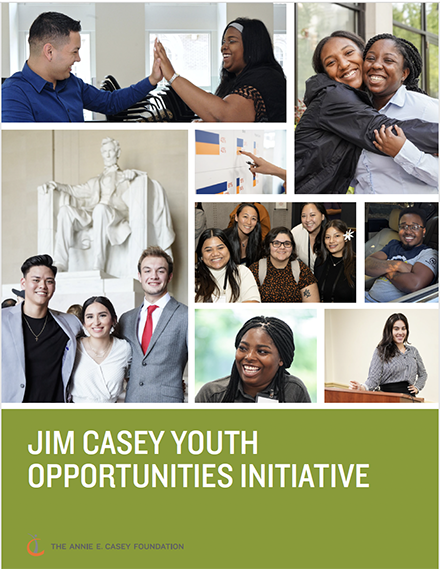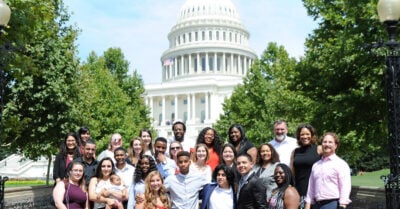The Jim Casey Initiative works nationally and through partnerships in states to focus on four areas that indicate how well young people are doing as they transition from foster care into adulthood. The Foundation seeks to ensure that all young people, regardless of racial and ethnic background or where they are from, have equitable access to these pillars of positive well-being:
- Permanence: Young people are connected to caring, supportive adults. This is critical to ending the pipeline of youth exiting foster care without the permanent relationships that can help them navigate adulthood.
- Stable Housing: Young people have a safe place to live that they can call their own. Housing stability is a fundamental need and contributes to educational attainment, gainful employment and feelings of safety and security.
- Education Success and Economic Security: Young people earn a high school diploma and postsecondary credentials, have access to work opportunities and can build financial management skills.
- Pregnancy Prevention and Parenting Support: Young people have the tools and skills needed to make informed decisions about parenthood, while also ensuring that those who are expecting or parenting have the resources, opportunities and support needed for the well-being of themselves and their children.
The Jim Casey Initiative's approach is rooted in adolescent brain research and employs the following best practice principles:
- Authentic youth engagement to partner with and engaging young people, believing that they are equal contributors to decision making, to build leadership skills in decision making on policies, practices and programming.
- Race and ethnic equity and inclusion to address overrepresentation of youth of color in foster care and disparities in outcomes.
- Partnership and resources to align and leverage key partners in the public and private sectors in order to create and sustain reform.
- Data and accountability to generate and use data to inform decision making, measure progress and be accountable for ongoing improvement.
- Public will and policy to establish and sustain improvements in the lives of all young people, build public will and improve local, state and national policy and practice.
Results from the Jim Casey Initiative’s work include:
- more than 200 policy and practice improvements over the past five years that cover a range of issues affecting young people;
- leadership of Success Beyond 18, a campaign that worked to extend foster care beyond age 18, sparking new legislation in numerous states;
- broadly disseminated research and other resources to increase knowledge and evidence about improving outcomes for young people transitioning from foster care;
- increased the leadership and advocacy skills of Jim Casey Initiative Young Fellows and other young people around the country through authentic youth engagement;
- the development of Opportunity Passport®, through which more than 4,400 young people have saved over $7 million and purchased $16 million worth of assets. Asset purchasing has been shown to improve outcomes important to the long-term trajectory of young people's lives, including securing stable housing, pursuing education and being employed; and
- approximately $85 million of public and private resources leveraged annually by Jim Casey Initiative partners to strengthen services that lead to better outcomes for young people.
The Jim Casey Initiative has developed substantive tools and resources, including:
- Keys to Your Financial Future, a curriculum that helps young people build the financial skills they need to gain financial independence.
- Expectant and Parenting Youth in Foster Care: Systems Leaders Data Tool Kit, a tool kit to assist system leaders in gathering, assessing, sharing and leveraging data on expectant and parenting youth in foster care.
- Future Savings: The Economic Potential of Successful Transitions From Foster Care to Adulthood, a report that details the economic potential of investing in better results for young people as they transition from foster care.
- Fostering Youth Transitions, a publication utilizing the most comprehensive data to fill in key details about young people who have experienced foster care.
- Equity Conversation Guides for Young Leaders and Partners, a set of four guides that provide step-by-step instructions for facilitators to lead groups of young people in understanding the history of structural racism.
- Brain Frames, a series of printable handouts that break down The Road to Adulthood report with quick bullets, fact boxes and sample conversations.
- Brain Gains, a video that discusses adolescent brain development and ways child welfare systems inhibit or encourage opportunities for a successful transition to adulthood.
- The Road to Adulthood, a guide that educates adults on how they can do more to ensure the road leaving foster care will take young people to self-sufficiency and successful adulthood.








